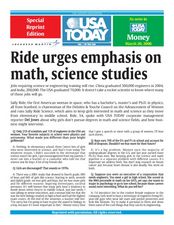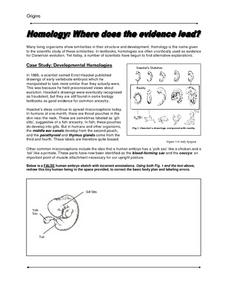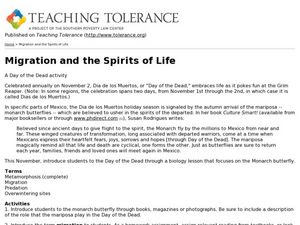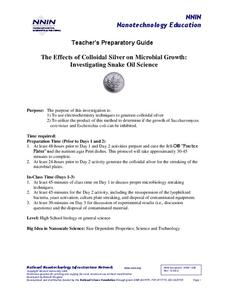Curated OER
Human Traits
Young scholars study vocabulary and complete a survey. In this human traits lesson students collect and analyze data then discuss what they learned.
Curated OER
Ride Urges Emphasis on Math, Science Studies
Seventh graders read over an article and study vocabulary terms. For this investigative lesson students discuss questions about the article they read and complete a small group activity.
Curated OER
Homology: Where Does The Evidence Lead
Students are introduced to the topic of homology. In groups, they read a case study and compare different drawings of early vertebrate emryos. They work together to answer discussion questions and label the various parts of each embryo.
Curated OER
Addiction As A Disease
Students study drug addiction and its problem in society. In this addiction lesson students answer questions and complete an activity.
Curated OER
Where is That Light Coming From?
High schoolers investigate the chemistry of bioluminescence and discuss how various organisms benefit from this trait. They prepare a report about of at least one organism that receives each of the benefits discussed.
Curated OER
Environmental Science/Water Pollution
Young scholars study natural habitats, aquatic life, renewable and non-renewable resources. They discuss conservation efforts for sea otters and desert toad in this units.
Curated OER
Eelgrass Bed Exploration
Students study the function and biological value of eelgrass beds. They discover the habitat requirements of the beds by reading a hand-out and completing a worksheet.
Curated OER
Mussel Movements
Students consider the impact of invasive species on local environments. In this ecology lesson, watch the video, Arizona Wildlife Views, which focuses on invasive species. Students develop vocabulary, relate to meaningful comprehension...
Curated OER
The Fish Trade
High schoolers read and discuss a document regarding how the global fish trade is important to humans all over the world. Students conduct Internet research and write a scenario about what would happen if other countries did not help...
Curated OER
The Opposable Thumb
Students explore the physical importance of the opposable thumb among primates. They discover which of their simplest daily activities are possible only because of their opposable thumbs.
Curated OER
Migration and the Spirits of Life
Students study the Mexican traditions for the Day of the Dead. In this Mexican traditions lesson, students study monarch butterflies and learn about the role that the mariposa plays in the Day of the Dead. Students learn about migration,...
Curated OER
Lesson Plans for the Novel "Jurassic Park"
High schoolers read the book, Jurassic Park, then answer questions.
Curated OER
2005 Hidden Ocean Expedition What's Eating You?
Analyze data and make inferences about the trophic position of organisms in the Canada marine food web. After a review of the geography and formula, discuss results and write an essay to improve the understanding of Artic food webs.
Curated OER
C.S.I. on the Deep Reef
Young scholars study chemotropic sybioses and chemotropic nutrition. In groups, they complete a Chemotrophic Species Investigations (CSI) Worksheet.
National Nanotechnology Infrastructure Network
The Effects of Colloidal Silver on Microbial Growth: Investigating Snake Oil Science
Can your classes solve the problem of the smelly sweat sock? Young scientists complete a lab investigation that begins by using electrochemistry to generate colloidal silver. They use their solutions to test the rate of microbial growth...
Curated OER
Genetic Analysis
Students formulate a hypothesis regarding the validity of the current status of the Arizona Hedgehog cactus as a distinct variety of cactus. They design a procedure to isolate DNA from the tissue of plants, given a list of chemicals and...
Curated OER
Quick Concept Demonstrations
Students research the nervous system. Demonstrations on how to pick up keyed information in text is shown daily and weekly. Reviewed for content is Nerve Impulse, Polarization and Depolarization and perception. A spreadsheet will graph...
Curated OER
Smelly Balloons
High schoolers investigate the concept of diffusion through a membrane. They do this through the conduction of a simple experiment. Students make observations while determining if the smell of different chemicals seeps through the...
Curated OER
Who's the Father?
Students analyze gels to determine parentage in this lesson about scientific evidence, investigation, and DNA concepts. The lesson includes a pre-activity worksheet, a final individual assessment, and student handouts for in-class...
Curated OER
Biodiversity: El Imposible National Park, El Salvador
Fifth graders explore the concept of how the more diverse an ecosystem is, the more interdependence of species exists within that system. The complex relationships among diverse species are difficult to identify. As species disappear or...
Curated OER
Endangered Species Problem
Young scholars list the morphological characters used to identify the cacti in the field, and describe the associated problems in using these characters for identification. They draw the geographical ranges of the varieties of species...
Curated OER
Learning the Structure and Function of DNA
Students read about Humane Genome Project, examine structure and function of DNA, and participate in gel-electrophoresis lab. They complete Internet activity to test their knowledge of DNA.
Curated OER
Biodiversity Debate - Stream Side Science
Role play community members who are both for and against the construction of a dam. Research the pros and cons and then hold a classroom debate. This activity ideally follows a series of stream studies, links to which are included. Use...
Field Museum
The Case of Darwin's Finches
One of the most striking pieces of evidence for Darwin's Evolution of Species was his observations of finches and how their beaks differed from island to island, depending on their primary food sources. So what would happen to the theory...

























